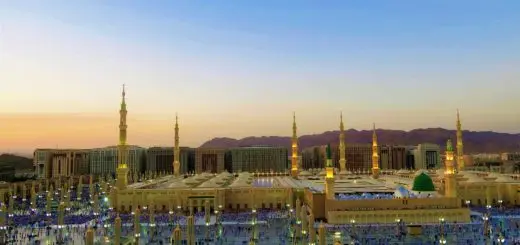Muhammad: The Messenger of Allah

Looking for more amazing products? Check out our online store and explore our collection here! Happy shopping!
Before diving in, please note: This post is for informational purposes only. If you’d like to know more about how we approach topics, feel free to check out our friendly Disclaimer Page.
Hey there, amazing readers! 
We’re committed to delivering quality posts, and your support (even just sticking around despite the ads) means everything to us. So, bear with us, and thanks for helping us keep the good vibes rolling. Now, on to the fun stuff!
TRANSLATE BUTTON AT THE END OF THE ARTICLE
Introduction to Muhammad: The Messenger of Allah
Muhammad, known as the Messenger of Allah, is revered by Muslims worldwide as the last prophet sent by God to humanity.
Born in Mecca in 570 AD, he is considered the founder of Islam and the leader of the Muslim community.
His teachings and actions are recorded in the holy book of Islam, the Quran, which Muslims believe to be the verbatim word of God.
Muhammad’s life serves as a guiding light for Muslims, showcasing the importance of faith, compassion, and ethical behavior in all aspects of life.
Early Life and Background of Prophet Muhammad
Muhammad was born into the Quraysh tribe in Mecca, a major trading city in the Arabian Peninsula.
Orphaned at a young age, he was raised by his grandfather and later by his uncle.
Despite growing up in a society rife with idol worship and tribal conflicts, Muhammad was known for his honesty, integrity, and moral character.
These qualities earned him the title of "Al-Amin," meaning the trustworthy, among his peers.
Prophethood and Revelation of the Quran
At the age of 40, Muhammad received his first revelation from the Angel Gabriel while meditating in a cave on Mount Hira.
Over the next 23 years, he continued to receive divine revelations, which were later compiled into the Quran.
As the final prophet in a long line of messengers, Muhammad’s mission was to convey the message of monotheism and call people to worship one God, Allah.
Muhammad’s Role as a Religious Leader
Muhammad’s role as a religious leader extended beyond preaching and teaching.
He served as a judge, mediator, and military commander, guiding his followers in matters of faith, ethics, and governance.
His leadership style emphasized consultation, mercy, and justice, setting a precedent for future Muslim rulers and scholars.
Teachings and Beliefs of Islam
Central to Muhammad’s teachings was the belief in one God, known as Tawhid in Islam.
He also emphasized the importance of prayer, charity, fasting, and pilgrimage to Mecca.
Muhammad’s teachings promoted social justice, equality, and compassion towards all members of society, regardless of their background.
Challenges Faced by Muhammad in Mecca
In Mecca, Muhammad faced opposition from the Quraysh tribe, who viewed his message as a threat to their traditional beliefs and practices.
Despite persecution and ridicule, Muhammad continued to preach the message of monotheism, drawing a small but devoted following of early Muslims.
Migration to Medina and Establishment of Ummah
In 622 AD, Muhammad and his followers emigrated to the city of Medina, seeking refuge from Meccan persecution.
This event, known as the Hijra, marked the beginning of the Islamic calendar.
In Medina, Muhammad established an Islamic community, or Ummah, based on principles of unity, equality, and justice.
Battles and Conquests during Muhammad’s Time
As the leader of the growing Muslim community, Muhammad faced military conflicts with neighboring tribes and empires.
Despite limited resources, he led his followers to victory in several battles, including the Battle of Badr and the Conquest of Mecca.
These military campaigns were not aimed at expansion but rather at self-defense and the protection of the Muslim community.
Last Sermon and Farewell Pilgrimage
In his final years, Muhammad delivered his Last Sermon during his farewell pilgrimage to Mecca.
In this sermon, he emphasized the importance of unity, justice, and compassion among Muslims, leaving behind a legacy of peace and harmony.
Shortly after his return to Medina, Muhammad passed away, leaving a profound impact on the Muslim world.
Legacy of Prophet Muhammad in Islamic History
Muhammad’s legacy as the Messenger of Allah continues to resonate in the hearts of Muslims worldwide.
His teachings on faith, morality, and social justice have inspired generations of believers to strive for a better world.
The example set by Muhammad in his personal and public life serves as a model for Muslims seeking to emulate his character and values.
Importance of Following the Sunnah of Muhammad
The Sunnah of Muhammad refers to his teachings, actions, and sayings recorded in the Hadith literature.
Muslims are encouraged to follow the Sunnah as a way of drawing closer to the Prophet and living a life in accordance with his teachings.
By emulating Muhammad’s behavior and manners, Muslims aim to strengthen their faith, improve their character, and contribute positively to society.
Conclusion: Impact of Muhammad as the Messenger of Allah
Muhammad, the Messenger of Allah, holds a central place in the hearts and minds of Muslims worldwide.
His life and teachings have shaped the beliefs and practices of the Islamic faith, serving as a source of guidance and inspiration for millions of believers.
Through his example of faith, compassion, and perseverance, Muhammad continues to be a beacon of light for those seeking guidance in a complex and ever-changing world.
As Muslims strive to follow in his footsteps, they honor his legacy and contribute to the betterment of society as a whole.

The Enlightenment Journey is a remarkable collection of writings authored by a distinguished group of experts in the fields of spirituality, new age, and esoteric knowledge.
This anthology features a diverse assembly of well-experienced authors who bring their profound insights and credible perspectives to the forefront.
Each contributor possesses a wealth of knowledge and wisdom, making them authorities in their respective domains.
Together, they offer readers a transformative journey into the realms of spiritual growth, self-discovery, and esoteric enlightenment.
The Enlightenment Journey is a testament to the collective expertise of these luminaries, providing readers with a rich tapestry of ideas and information to illuminate their spiritual path.
Our Diverse Expertise
While our primary focus is on spirituality and esotericism, we are equally passionate about exploring a wide range of other topics and niches 

To ensure we provide the most accurate and valuable insights, we collaborate with trusted experts in their respective domains 
Our blog originally focused on spirituality and metaphysics, but we’ve since expanded to cover a wide range of niches. Don’t worry—we continue to publish a lot of articles on spirituality! Frequently visit our blog to explore our diverse content and stay tuned for more insightful reads.
Hey there, amazing reader! 
Check out our store here and take a peek at some of our featured products below! Thanks for being awesome!










